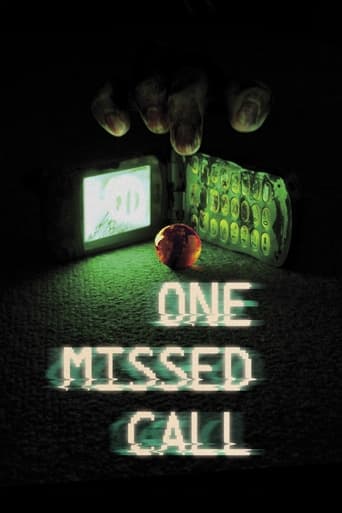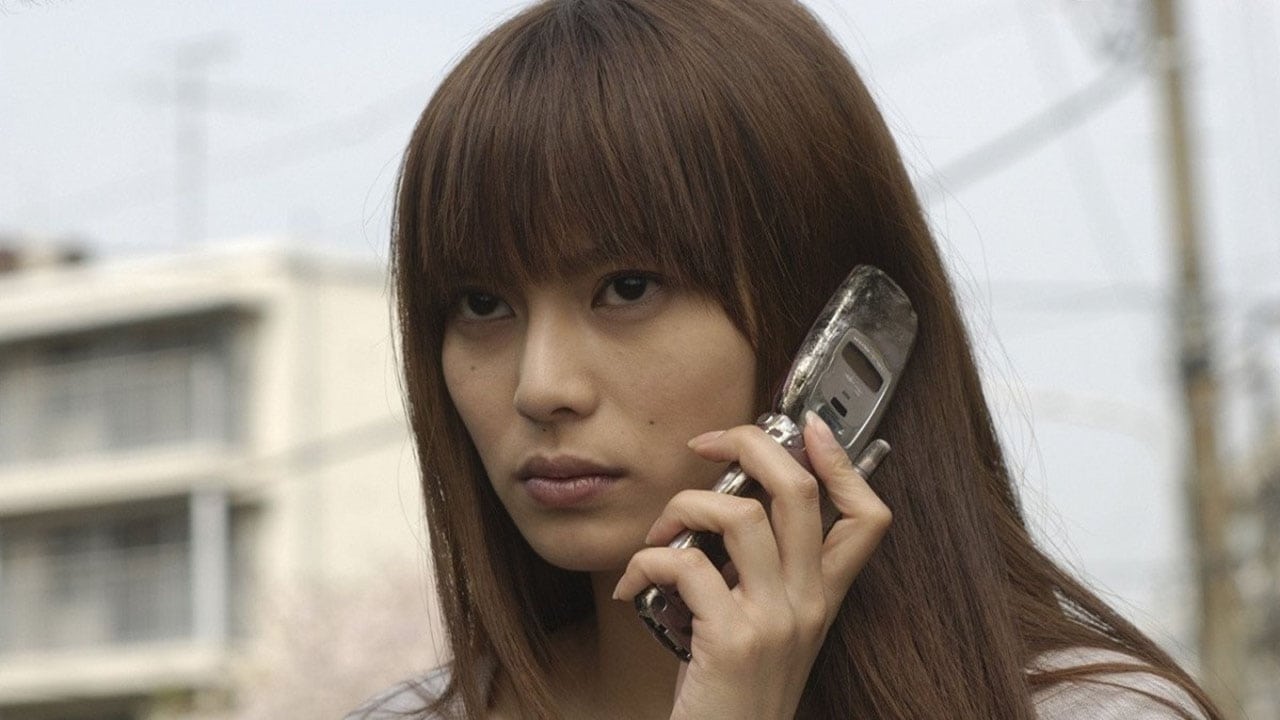cmpfsh
I went into One Missed Call expecting that it was going to be another terrible chapter in Japanese copycat horror films. My hopes were raised when I saw Takashi Miike in the opening credits (longtime fan, didn't know this was one of his).Midway through the movie, my expectations were rising. It was actually good! There was a deep central theme, the story was carried out well, the pacing was good, the characters were accessible and believable, and it was damn scary. For a campy horror flick about cell phones, there was a lot of refinement.The reason I didn't rate it higher was that it had some obvious flaws. For one, it was longer than it needed to be. A campy horror flick is, after all, a campy horror flick, and doesn't really need to be two hours long. Also, the ending threw me for a bit of a loop, but I won't spoil it.Watch it for yourself, preferably in high-def and with the lights out. Seriously scary.
MovieGuy01
I watched the Japanese horror film, One Missed Call last night, and i thought that it was a excellent film, and far better than the American remake. It is about a teenager Yoko Okazaki who is in a bar with her friends, she receives a voice mail from the future telling the date and time when she will die. The next day, Yumi hears a group of students talking about the story where people are mysteriously receiving phone calls with the exact date and time of their death. a couple of days later at the exact hour, Yoko is attacked by a supernatural force in a train station, while she is talking to her friend Yumi Nakamura. Yumi finds out Kioto's boyfriend Kenji Kawaia also received a call, and she witnesses his death in an lift. When her roommate Natsumi Konishi receives a call, Yoko becomes friends with Hiroshi Yamashita, who tells her that his sister Ritsuko was the first victim of the phone call. They find that the name of Marie Mizunuma and her daughters Mimiko and Nanako have something to do with the strange phone calls. They begin a search to find out what is going on. I thought that this was a very good film and would recommend people to see it. 7/10
cwarne_uk
Yes "The Ring" was great, but the whole J-Horror thing is wearing very thin by the time you get to "One Missed Call". Miike made his name in the West with a string of films made around 1998 - 2001. They were sloppy - anyone that works as fast as him would be - but they had an undeniable loopiness that twisted genre conventions. "One Missed Call" is totally generic, if you've seen "The Ring" and "The Grudge" there is no reason to see this. Like "Imprint" (disturbing theme yes but so badly made as to be laughable) and "Box" (as bad as Parks' "Cut") it gives an impression that Miike is played out _ much like Asian Horror in general. I recommend the great French film "Them" instead.
Graham Greene
This just might be the most interesting psychological drama that I've seen since Miike's own masterpiece Audition (1999), and one that it seems has sadly been misinterpreted by many critics and viewers as being a work of simple J-Horror by numbers. Though it has elements of this, the characteristics of J-Horror, which are very much rooted in standard social and spiritual taboos that many Japanese people take incredibly seriously, are used as window dressing here, intended to distract the audience from the more important and subtle ideas at work behind the surface of the narrative.It certainly isn't a pastiche or a spoof as some viewers have indicated, though you could argue that it works on a certain satirical level, with the odd hint of benign humour that we've come to expect from Miike woven throughout. However, judging from much of the stylistic tone of the film, with its deeper allusions to child abuse and the murky and alienated tone that the director attaches to it, I honestly can't imagine that this is meant to be laughed at. Those who claim that the film is a comedy or a spoof are more likely to be Miike fans that are unfamiliar with the broader aspects of his work and the way in which he puts his films together; instead judging his films simply on the shock-value and tongue-in-cheek triviality of projects like Ichi the Killer (2002) and Dead or Alive (1999). Yes, he does accept any film that is offered to him, and more often than not chooses work that he feels he can do something interesting with; experimenting with the form and content and occasionally adding his own touches that are often subversive and somewhat attention seeking, but he always has in mind an approach that best suits the material.He doesn't condescend to his work; there's no cynicism here. As ever, Miike is fulfilling the wishes of his producer whilst simultaneously bringing something else to the film that may have been missed by a lesser filmmaker, more interested in the superficial quality of the story. In this case, a sly comment on the media and how it manipulates tragedy for profit; turning horror and pain into spectacle. It also continues the theme of lost youth; something quite prevalent in Japanese cinema, with films like Battle Royale (2000), Visitor Q (2001), Pulse (2001) and All About Lily Chou-Chou (2002) documenting the recent struggles in both social environments and education, with the idea of a generation of Japanese youth overwhelmed by expectations of family and society and cast adrift in such a way as to leave them ultimately more venerable to a greater evil (be it drugs, gang violence, suicide or crime). It's all done metaphorically of course - with the J-horror elements used to mask these ideas - though certainly, in many of the scenes, we see characters, kids even, isolated and with no one to turn to.Think about the presentation of both the film and the narrative; the absence of responsible adults creating a ghost world that these kids drift in and out of, turning only to each other for solace. The creation of a nocturnal world where school children hang out on railway bridges in the early hours of the morning, watching scenes of abject horror in a way that suggests tragic familiarity. The way that the background characters - the everyday people on the street - huddle under umbrellas watching a televised exorcism in the centre of Shinjuku completely cut off and detached from everything that is happening, becoming an almost representation of the audience even; eating up the pain and suffering as dismissible entertainment and completely missing the personal horror and exploitation of the abuse itself. Likewise, look at the scenes shot during the day. The streets are mostly empty, save for the presence of the adult media, the police (who have a complicated role within the film) and the students who are at the centre of the whole thing.Those claiming that this is a comedy seem uneducated when it comes to Miike and his work; looking for the vapid cartoon character and his torrents of gore and depraved sex, and not the finely nuanced filmmaker who gave us excellent, multi-layered works like Shinjuku Triad Society (1995), Rainy Dog (1997), The Bird People in China (1998), Audition (1999), Dead or Alive: Birds (2000) and Gozu (2003). As a horror film, this is effective. The scenes in the abandoned hospital, although clichéd, work incredibly well at ramping the tension. However, there's more to the film once we dig beneath the surface. The final act of the film takes place on at least three different levels; taking in the real, the imagined and the abstracted memory of both. The way Miike brings the various elements together - using stylised production design and skewed perspectives - creates a hall of mirrors like sense of abstraction familiar from the final act of Audition. Think about it. Is Gozu simply an absurd spoof on the latent homosexuality of the Yakuza sub-genre, or is there a more interest sub-textual argument about identity and gender being woven within? One Missed Call works on a similar level.Those who make the effort to watch Miike's work will know that there is always much more to his films than it initially seems, though you really have to work at it. To suggest that this is a spoof because you fail to appreciate the subtle, sub-textual storytelling and ask simply for mere cartoon-like abstraction is a discredit to a great filmmaker and those of us familiar with Miike's work beyond that of Ichi the Killer. With One Missed Call, Miike gives us a multi-layered film; shocking and satirical in equal measures and tied to a truly tragic depiction of loss, abuse and alienated youth.


 AD
AD





